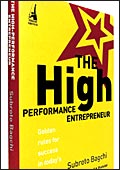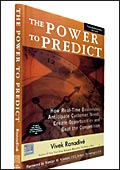 |
THE HIGH-PERFORMANCE
ENTREPRENEUR
By Subroto Bagchi
Portfolio
Pp: 244
Price: Rs 395 |
Typically,
books on entrepreneurship come in two varieties. One, from motivation
gurus or professional writers, and the other from really big entrepreneurs
(like Richard Branson) on how they cracked it. And usually, neither
is a fulfilling answer to someone who wants to figure out how
to become a successful entrepreneur. The problem with the first
variety is obvious: It's mostly written by people who have no
experience of starting and running a large business but, just
the same, feel compelled to advise others on the subject. The
problem with the second variety is that it is largely individual-specific.
Autobiographies don't offer distilled rules that can be generally
applied by everyone else. Thanks to Subroto Bagchi, we now have
a third, and a vastly more useful, variety: A practitioner's guide
to entrepreneurship.
Bagchi, readers would know, is one of India's
best-known tech-executive-turned-entrepreneurs, who teamed up
with a bunch of colleagues from Wipro, including Ashok Soota,
to launch MindTree Consulting, an it consulting company, in 1999.
In The High-Performance Entrepreneur, Bagchi sets out to lay down
the "golden rules for success in today's world" based
on his and his partners' experiences within and without MindTree.
Written in a simple and straightforward style, the book offers
to be the entrepreneur wannabe's friend and guide. To that effect,
it's almost designed like a manual. There are 18 chapters in the
book, all of them meant, first, as advisories and only then a
lesson on how MindTree did it. 'When Do I Know if I am Ready?',
'Writing a Business Plan', and 'Managing Your Money', therefore,
are some chapters you'll encounter in the 244-page book.
But make no mistake. The High-Performance
Entrepreneur is no evangelic spiel on entrepreneurship. As an
entrepreneur who's come up the hard way, Bagchi doesn't for a
moment pretend to be a cheerleader for starry-eyed youngsters,
keen on striking out on their own. He's more like a football coach-brutal,
honest, but always well meaning. Therefore, in the book, you'll
hear him say things like "If you don't need the money, do
not start a company"; "Comfort with postponed gratification
is a critical requirement of entrepreneurship'; or "the best
way to make an organisation opaque is to bring in relatives''.
To Bagchi's credit, he doesn't think anyone
needs to read a book on entrepreneurship to become an entrepreneur.
"You really do not need to read this book-for that matter
any book-to start your own enterprise," he advises. Just
like "...no amount of reading about romance is equal to the
act of falling in love...the actual experience (of entrepreneurship)
is in the enactment. So, go on and do it," he urges. Indeed,
but if you want to avoid costly mistakes, the Rs 395 you spend
on Bagchi's book may be the best investment your start-up makes.
 |
THE POWER TO PREDICT
By Vivek Ranadive
Tata McGraw-Hill
Pp: 239
Price: Rs 299 |
When you have people
like Mukesh Ambani, Nandan Nilekani, Rajat Gupta, Indra Nooyi,
and R. Gopalakrishnan writing testimonials for your book, selling
it to other readers shouldn't be a problem. But who is Vivek Ranadive?
He is the founder-CEO of TIBCO Software, a (Palo Alto) California-based
company that makes business integration and process management
software. An MIT and Harvard alumnus, Ranadive is considered an
authority on real-time technology, and has another book to his
credit (The Power of Now). In The Power To Predict, Ranadive argues
that companies can anticipate future developments and serve customers
better by continuously matching real-time events with historical
patterns. "The Power to Predict," writes Ranadive, "addresses
how seemingly insignificant situations can now be correlated,
interpreted and processed in ways we never thought possible."
According to him, several companies in the US are harnessing real-time
technology to build greater intelligence on their customers with
the idea of serving them better. So, The Power To Predict is really
a marketing pitch for the software TIBCO makes, but that doesn't
take anything away from the fact that intelligent IT can be a
powerful tool for business transformation. Or as the author says,
"becoming a predictive business is fundamental to the future
of any company."
|






